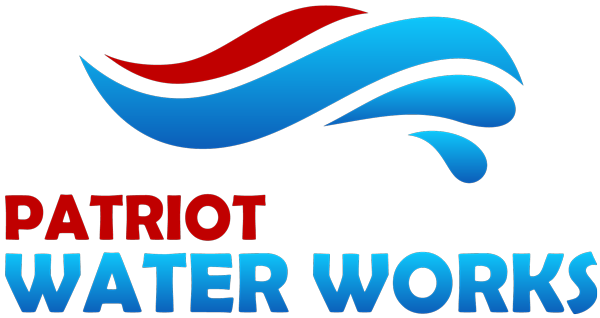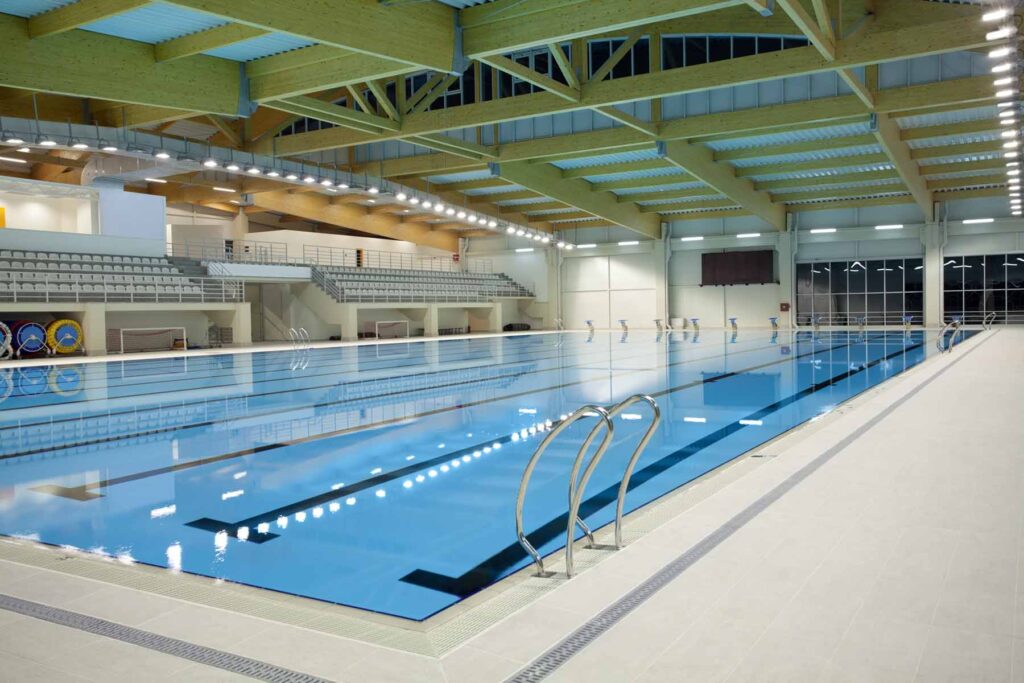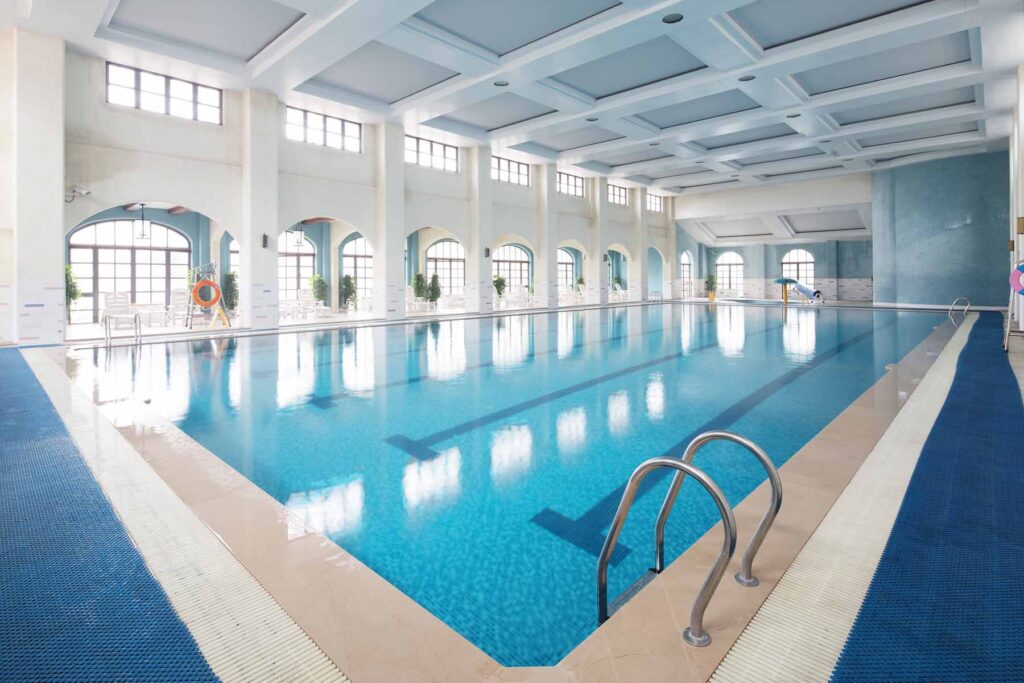Swimming Pool Filters
Commercial Pool Filters- Which Filter is Best?
When it comes to keeping your pool clean and ready for use, your filtration system is crucial. However, not all swimming pool filters are created equal, and some may not function well in your system. Below is helpful information to help you sort through the irrelevant information and settle on the best course of action?
Sand Filters
When it comes to pool filtration, sand filters are one of the most time-tested and reliable options. The No. 20 sand granules used in the filter are finer and sharper than the sand used on beaches or in playgrounds. The pool pump forces water through the sand filter system, collecting dirt and debris down to 25 microns in size before returning the clean water to the pool.
A filter’s efficiency increases as its micron rating drops. Sand filters for swimming pools are widespread and safe; however, they can’t filter out particles smaller than a certain micron size because of the sand’s greater micron level. In addition, sand filters typically require backwashing once or twice weekly, or if the water pressure in the filter rises by more than 10 psi from the original pressure reading, to flush out the built-up dirt and debris. To extend the filter’s useful life even further, chemical degreasing should be performed twice annually.
Because of its low cost, extended lifespan, and ease of replacement, sand is frequently used as a filter medium. The fiberglass used in sand filter tanks is extremely durable, often lasting for a decade or more. It is recommended to replace the filter’s sand every three to four years to keep it functioning properly. The work involved in removing and replacing the sand accounts for the majority of the total cost of a sand replacement.
DE Filter
Diatomaceous Earth (DE), which resembles powdered sugar, is formed from crushed silica-rich fossil material, specifically diatoms. It works wonderfully as a coarse filter for swimming pools and as an abrasive cleanser. A DE filter is functionally equivalent to a sand filter, except that it uses a mesh grid covered in DE rather than lump sand.
Among the best filtration media, DE can capture particles as fine as 4 microns, which is six times smaller than the pore size of a sand filter. One solitary human red blood cell won’t pass through this! Backwashing a DE filter is more time-consuming and could be harmful if done incorrectly, and the filters themselves tend to wear out faster.
Since DE is a carcinogen and causes respiratory issues when inhaled, extra precautions must be taken to safeguard operators when handling. Bathers should not worry about DE because it is contained within the filter and does not produce dust when wet. Dumping DE incorrectly is illegal under many local and state laws, which adds another layer of complexity. To properly backwash, you must have a system in place to collect and dispose of the used DE. When this happens, you’ll have to take out the DE filter and clean out the entire thing. The delicate cloth from which DE grids are constructed makes them prone to breaking easily. The filter will not be able to remove any dirt or debris from the water if the grid is damaged. Having a pool operator who is familiar with DE filters and processes is crucial because this is not a safe situation for swimmers.
Cartridge Filters
Cartridge filters for commercial swimming pools have become increasingly used in recent years as a filtration system. Cartridge filters, which are not formed of organic material but rather a polyester grid, have a micron rating that is lower than that of sand filters but greater than that of DE filters.
Although cartridge filter systems tend to be more expensive initially, their ease of use makes up for the extra cost. Cartridge filters don’t require a connection to a sanitary sewer because they don’t require backwashing, therefore they can be utilized in places where other systems can’t. However, cartridge filters do require periodic hand cleaning, which can be laborious. Manual cleaning is fortunately only required once a month or so if the system is well-designed and has adequate capacity.
Having a spare set of cartridges to swap in while you clean the others will ensure that the pool is kept filtered during your maintenance. To get the most out of your cartridges, let them dry and “fluff” again after cleaning. While the tank itself may endure for ten years or more, the filter cartridges within should be swapped out every two to three years at the very least.
Which Filter is Best?
The size of your pool and the treatment system at your facility will dictate the best course of action.
Commercial pools benefit greatly from sand filters because to their low maintenance requirements and scalability in relation to the number and size of storage tanks. Energy savings are directly proportionate to the size of your pool because they filter more water in less time than cartridges.
Cartridge filters aren’t the most cost-effective, but if your pool doesn’t get a lot of use, is on the smaller side, or you just want to spend less time cleaning it, they may be worth considering. If your pool is not connected to your sewage line, or if you reside in an area where it is illegal to discharge chlorinated wastewater into your sewage system, a cartridge filter may be necessary. Before it enters the sewage line, you could install a dichlorination system, but doing so would be more inconvenient than simply replacing the cartridge filters every few years.
Designing a system that is well-suited to your facility’s size and needs is just as crucial as choosing the right filter type. The systems must be able to endure the busiest and warmest days while yet keeping the water clear. Filtration systems sold to the public must, of course, conform to and often exceed regulations set by the relevant health department.
So, which filter type should you use for your business or public pool? We’d be happy to assist you in finding the answer to that query if you’re still having problems doing it on your own.
Patriot Water Works – Pennsylvania, New Jersey, Maryland and Delaware
Companies and individuals throughout Pennsylvania, New Jersey, Maryland, and Delaware may rely on Patriot Water Works for all their aquatics service needs. Helping with plumbing, electricity, system design, and water quality are just some of the many things we can do thanks to our 12 sites and years of experience in the hydronic and aquatics industries. We collaborate with designers, builders, and producers to maximize a system’s return on investment by lowering energy use, extending the life of key components, improving user comfort, and more. We also construct highly efficient cooling, heating, and water heating systems. Our Lancaster, PA office helps businesses and factories all around the United States. Call us today and let’s get started on your pool project.


